Gold It has been highly valued for more than a thousand years. And in different times there were manufactured means of payment of a certain form. The most common is round (coins). Today they also produce ingots. They have many parameters by which to determine the authenticity and quality of the material. It is also necessary to know, how much does gold bar. It must contain a certain amount of precious metal.
The physical form of investing in gold
In ancient times they used to put identification marks on valuable metals. In the modern world, too, different kinds of marks are used. But standardized marks were introduced several centuries ago. Before that, each producer had his own seals and engravings.
Thanks to branding, the system of buying and selling was simplified. Gold became even more widespread; today it is one of the instruments of investment.
It is distinguished by a set of properties:
- stability in the long term: the price is maintained even in difficult times (when there are cataclysms, wars, economic crises), while a slight decrease is possible, but even then Au remains the most valuable resource for which goods and services can be canceled;
- separability: the production of coins and bullion does not cancel their properties, they are just as valuable as a large piece of precious metal or a nugget;
- preservation of physical properties: valuable metal does not lose its attractiveness, it is not subject to corrosion.
For investing different types of bars are used. They are standardized, must meet the parameters according to GOST. It is allowed to produce ingots according to an individual order, they may differ in size and weight. The branding is also different in this case. Sometimes even the portrait of the owner is put on such products.
Bank coins
Coins differ in type of material, weight, and size. They are produced in series and may have a name. A separate category is represented by those that are issued in limited quantities. The price of this type of precious metal is higher than that of coins produced in large quantities. It is thought that investment gold should be of the highest value (high grade), but there are different types stamps from 900. Among them there are non-standard options. But the most popular products are 999 proof. They are also the most valuable. Accordingly, the value of such coins is higher.

Jewelry
For jewelry to last a long time, you have to make it from an alloy that contains a certain amount of impurities. This makes them less valuable. As a result, it becomes impractical to invest in jewelrybecause you have to sell them at a lower price.
The exceptions are those that are made of gold alloy 960 and above.
They are not originally intended for private wear, but are rather a luxury item, a tool for investment. They are distinguished by their attractiveness and rare design, as they are custom-made.
Bank bullion
These are bars of rectangular, trapezoidal shape (depending on weight). Weight may vary: from 1 g to 1 kg, but there are other options, although they are less common. Metal sample The variation is different, but for bullion, the 995 variation is considered to be the minimum allowable. This means that a standard 1000g gold bar contains 5g of impurities. Absolute purity of the precious metal is difficult to achieve, because even in nature, it often includes additives or is a component of another rock. The fewer impurities, the higher the price.
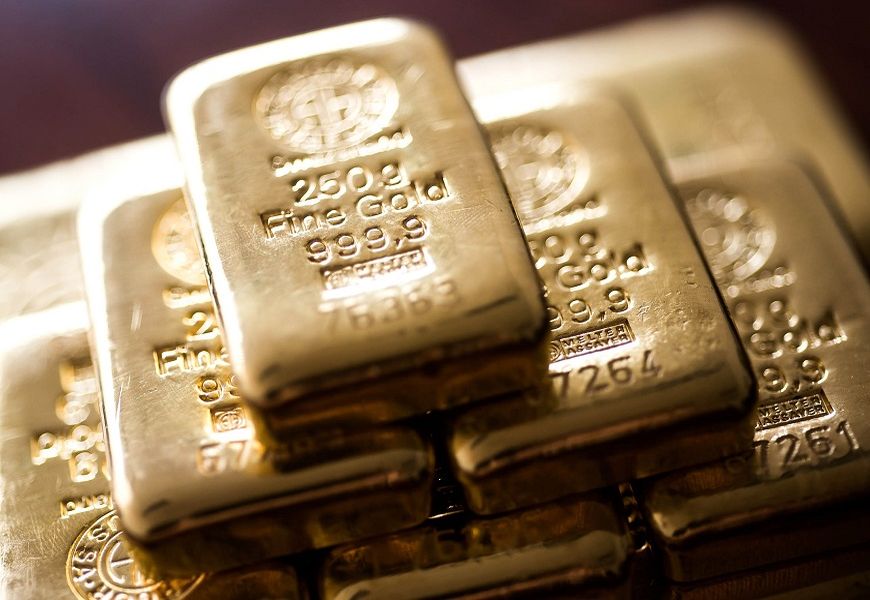
Measures for sale
The target audience is individuals. Accordingly, the size of such products is relatively small - up to 1000 grams. Available variants of bullion weight gold in storage: 1, 5, 10, 20, 50, 100, 250, 500, 1000 г. They meet the standard - GOST R 51572-2000. The bars of this type are produced in Russia and America. The main feature is the high proportion of gold in the composition - 99,9%. They are usually packed. They are kept in a plastic or polyethylene box, which cannot be opened. They do not come off. Damage to such packaging is not allowed either, as it will lead to a decrease in precious metal prices. Some banks agree to buy it for the price of scrap.
You can buy and sell bullion bars in banks and jewelry stores.
Stamped SSZs are the most expensive
SSZ is a type of measured products. The products are considered the most expensive. This is due to the attractiveness, smoothness of the surfaces. The shape can also be different. The metal acquires such properties due to the manufacturing method - products are stamped. The production technology has contributed to the appreciation of ingots of this type, because expensive equipment is used. The most common variant among consumers (individuals) is 50 g.
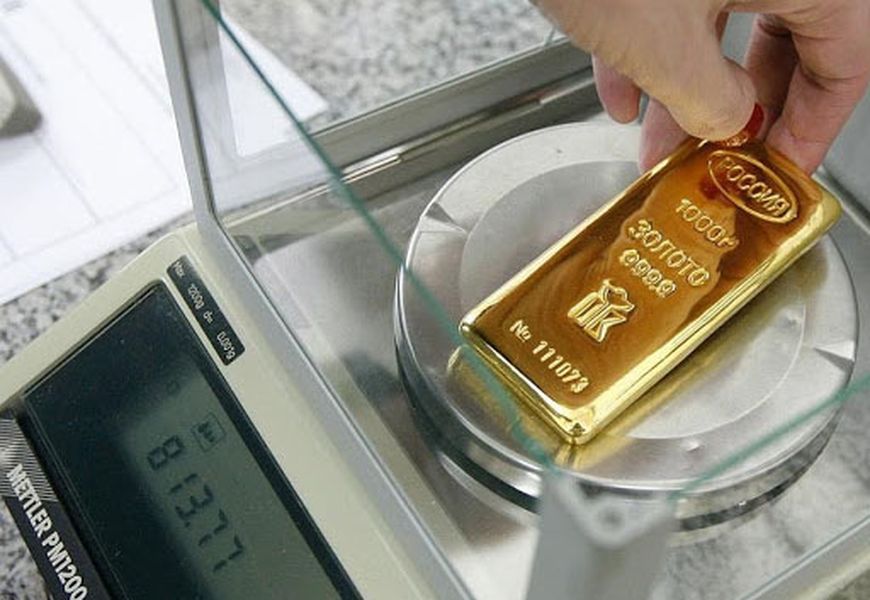
Varieties of SSH
Different gold bars are produced, the weight and size may vary greatly, but the thickness is not rationed:
- SSZ 1: weight 1 g, length 12-15 mm, width - up to 9 mm;
- SSZ 5: weighs no more than 5 g, is characterized by a length of 22-25 mm, width - up to 15 mm;
- SSZ 10: ingot 10 g (dimensions no larger than 29x17 mm);
- SSZ 20: weight 20 g (33x19 mm);
- SSZ 50: 50 g (48x28 mm);
- SSZ 100: 100 g (56x33 mm);
- SSZ 250: weight 250 g (81x48 mm);
- SSZ 500: 500 g (102x60 mm).
Cast SLZs are cheaper
The ingots are produced with a weight of up to 1 kg. This possibility is due to the use of a simpler production technology. Cast gold ingots are produced by casting the mass that has been pre-melted. This method makes the ingots more affordable. The casting method is used in the production of measured and standard bars.
Varieties of SLZ
Thickness is not regulated, as in the case of the cast variety. Manufactured:
- SLZ 20: weighs 20 g (overall dimensions: 27x13 mm);
- SLZ 50: 50 g (32x17 mm);
- SLZ 100: weight 100 g (dimensions reach 43x23 mm);
- SLZ 250: 250 g (64x32 mm);
- SLZ 500: weight 500 g (86x38 mm);
- SLZ 1000: Maximum weight of cast ingots - 1000 kg (116x52 mm).
Powder - do not comply with GOST of the Russian Federation
This type of ingots is not stipulated by the Russian standard. They differ in the method of production - they are made by means of electrolytic technology. The raw material for creating such bars is gold powder. It is shaped and compacted by means of an electric current. Gold bars of this type are cheaper than stamped and cast ones. But they are also much less common.
Varieties of powders
Electrolytically produced ingots are almost always large. Few types differ in mass:
- 250 г;
- 500 г.
There is a misconception that there are kilograms of powder ingots. But this is a misconception, the maximum weight is 500 g. Given that they do not comply with the Russian standard, the sizes can be different (within the specified limits).
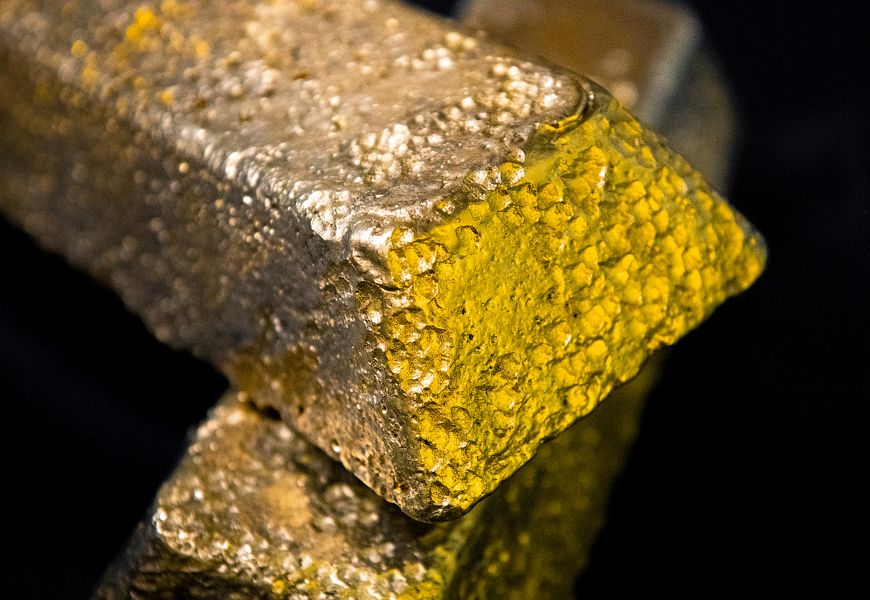
Standard - for production
Standard bars are used only as a raw material base in the manufacture of jewelry products of various types. They are not intended for sale to individuals. The size and weight of gold bars of this type are similar, as there is no need to produce a variety of product variants that will be melted down.
The weight may amount to 11-13 kilograms. And standard gold bars have a number of characteristic features:
- allowable size of defects - no more than 0.5 cm (difference in levels at different points of the surface);
- the structure is a low prism, if the customer wishes, it is changed to a suitable option;
- identification marks must be on the bottom plane of the product.
GOST requirements for ingots: weight, shape, surface, concavity, depth of stripping, assay and branding
Only the most obvious information about gold alloy ingots lies on the surface: weight and dimensions. Many people also try to check the different types of branding (assay is one of the options). But there are other key parameters that should be taken into account when producing, selling.
Weight - how much a standard 999 gold bar weighs in kg in Russia
On the territory of the Russian Federation, the metric system of punching, as well as the system of units of measurement with the same name, is generally accepted. According to it, the weight is measured in grams. GOST R 51572-2000 contains information about the weight of ingots, deviation limits. There is one more standard, which regulates parameters of standard ingots: GOST 28058-15. According to it, the permissible weight may be between 11-13,3 kg.
Russia's vaults, where the gold reserve metal is stored, contain ingots of different sizes and weights, one can weigh from 1 to 13.3 kilograms.
Size
The parameters of gold vary, which depends on the type of manufactured product. A bar that weighs 1 kg has parameters:
- length within the range of 105-116 mm;
- width: 48-52 mm.
The thickness of ingots weighing up to 1 kg is not regulated, so the other parameters are decisive. Standard bars are much larger. In manufacturing, an error of +/-5 mm is allowed. Dimensions of one of the options:
- The parameters of the small base: length 229 mm, width 59 mm;
- dimensions of the larger ingot base: length 254 mm, width 88 mm;
- height - 35 mm.
And the permissible deviation in height is more significant than in other parameters. It is +/-8 mm.
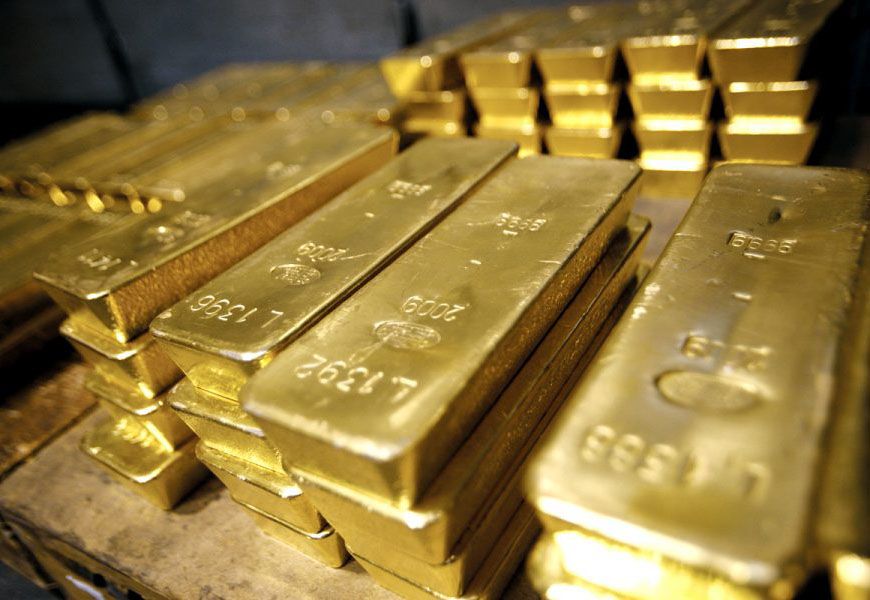
Form
Bars differ in shape. Small (measured) can be rectangular, because they are characterized by a small thickness, which is not even normalized by the standard. There is another type of bars. They are much larger, so it is possible to change the shape. Standard bars are produced in the form of a truncated pyramid. But there is a possibility to produce bars of a different shape. For this purpose, all parameters are agreed with the customer - according to his desire.
Surface
The quality of Au plays a role in the evaluation before sale. Minor damage to standard items is acceptable. But they are not left like that. Stripped spots are acceptable. Here the surface is somewhat deepened, which is considered normal, provided the error range is met.
Concavity
One of the criteria is the deviation from flatness, which is accompanied by the formation of inconspicuous recesses. In this case, there is a removal of the surface points of the cross-section of the bar from the horizontal plane, which is located next to it: the increase is observed from the edges to the middle. This effect is possible due to the shrinkage of the precious metal. The concavity is not more than 5 mm.
Scraped depth
Surface distortion may be insignificant, as the price of a bar with noticeable defects is significantly reduced. The permissible depth of scraped areas is 1 mm.
Sample 4 nines
The mass fraction of Au is determined during manufacturing at the stage when the molten metal is poured (the middle of the batch). In addition, the consumer takes a sample before purchase, but by drilling with a carbide drill (from two opposite corners), the diameter of the hole is 6 mm. Weight of the material that is taken for control - from 25 g. If there is a suspicion of poor quality of the metal, the sample stored at the manufacturer is analyzed. The maximum value of impurities - 5 g per 1000 weight parts.

Marking
It is necessary to indicate what parameters characterize a gold bar, weight and Sample - basic data that are fixed on one of the faces of the bar. Other information:
- ingot number;
- manufacturer's trademark.
Measures of gold: kg and troy ounce
One of the foreign units of measurement is troy ounce. In the Middle Ages, the French city of Troyes used an ounce as a measure of weight. Today it is used in jewelry, to measure the weight of especially valuable components in the manufacture of cosmetics, as well as in banking, but not everywhere. The Central Bank establishes on a daily basis precious metal valueConsidering the price of a troy ounce on the world market (set by the London Stock Exchange).
Methods of bullion production
- stamping;
- casting.
High-tech equipment is used for stamping. And there are limitations in terms of weight. To obtain gold ingots with perfectly smooth surfaces, they are produced weighing no more than 500 g.
The stamping method allows you to get a regular parallelepiped, it is distinguished by its mirror surface.
The other method is casting. It requires the use of molds. When the liquid melt hardens in them, the bars are removed. They also have smooth edges, but the appearance is less attractive than that of ingots, which are made by stamping.

History of the appearance of gold in bars
Gold began to be used as a means of payment since ancient times. But then there was a difficulty in payment - each time it was necessary to weigh it, to determine the quality of the precious metal. This made it difficult to conduct transactions.
About 600 years BC, the ancient Indians began to use a new method - melting an alloy of silver and gold, today it is called electrum.
The precious metal had a certain value, weight, which had to be indicated on the article (state branding). This solved the problem of the need to constantly monitor the quality of gold in the absence of extensive facilities.
Bullion weights in other countries
The standards are somewhat different abroad. Different countries (USA, Spain, England, etc.) may use different methods of bar production. One such method is electrolytic (not used in the Russian Federation). The weight of a gold bar constituting the gold standard is 400 ounces which corresponds to 12.44 kg when converted to the metric system. There are ingots of non-standard sizes (2 or 2.5 g) which are not produced in the territory of the Russian Federation.
The highest quality ingots are labeled Good Delivery. They are valued all over the world and in the Russian Federation.
How much does the largest gold bar weigh?
The largest gold bars are produced in different countries:
- Japan: the manufacturer is Mitsubishi Materials - the ingot weighs 250 kg and is worth 325 million rubles, or $12.5 million;
- Taiwan: The gold weighing 220 kg was considered the first piece so large, but as a result it did not make it into the Guinness Book of Records (the Japanese version was awarded this honor).
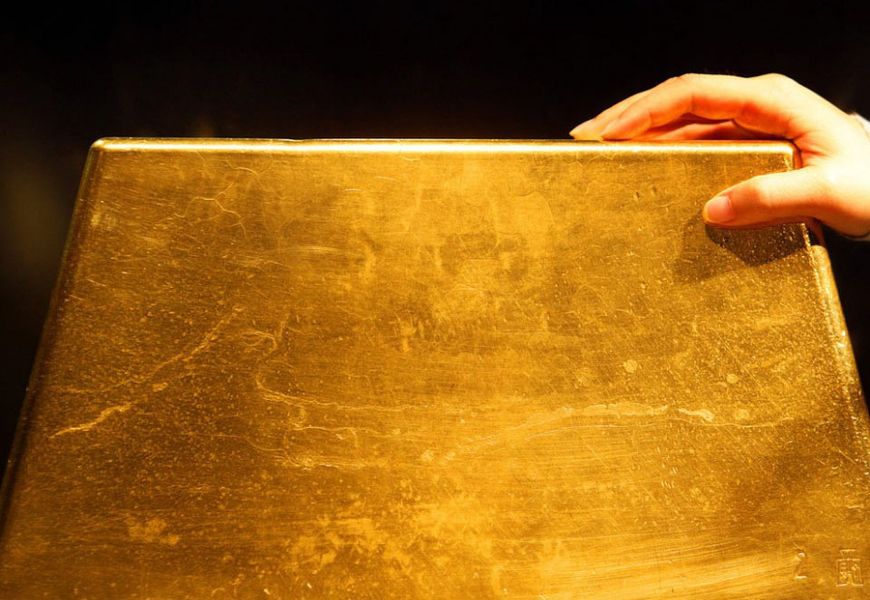
Gold bullion documents
To sell a bar of gold (no matter how much it weighs), you must not only confirm the quality of the alloy, but also present documents on the ownership of the value. When you buy an ingot, you must be in possession of it:
- a receipt from the bank for the purchase;
- A certificate indicating the appropriate GOST and method of manufacture and other key parameters of the gold.
How is the sale at the bank
To buy valuable metal, you need to bring your passport. Otherwise you will not be able to purchase Au. There are no additional costs (commission, fee, etc.). A certificate and receipt are issued to the new owner. If you need to sell the bar, you will have to pay VAT (if 3 years have not yet passed from the date of purchase).
If you take the physical Au out of the certified vault after purchase, you will have to pay VAT. It is recommended that the bar be deposited with the bank immediately.
The cost of the ingot
The price is formed based on the size and weight of the valuable bar. The composition of the alloy and the condition of the precious metal are equally important. If there are any defects, the bank accepts it with the condition of charging an additional commission. The price can be lower if a large quantity is purchased at once. One gram of Au is the most expensive.
Table: Price of 1 gram of gold
The original is cost Au set by the London Stock Exchange. Then the Central Banks of different countries (including Russia) form their value, based on this Sberbank, VTB and others also set the price, as a result it may be more clearly different from the original. Today the value was:
| Price 999 according to the Central Bank of Russia, rubles. | Price for scrap, rub. | Price in jewelry, rub. |
|---|---|---|
| Market value, rubles. | Price for scrap, rub. | Price in jewelry, rub. |
| 4194 | 3700 | 4200 |
Where else can you buy gold bullion
Most often the purchase/sale of Au is done through a bank (this is the most recommended option). But there are others as well:
- transaction with private individuals;
- stores that have a license;
- jewelry is the rarest option.
In private transactions, there is a high risk of losing money, and it is unlikely that you will be able to buy high-quality goods. Reasons: the seller does not have a certificate or receipt; can be robbed.
Asset storage options
Common ways to preserve the precious metal:
- Keep it with you, but this option should only be chosen if you have a safe, otherwise you could lose your valuables if they are stolen, because burglars usually know about all the hiding places that owners consider safe in their homes;
- Store in the bank: immediately after the purchase you can leave Au there - in the vault, you need to sign an agreement that will contain all the conditions, but will have to pay for such a service.
Video: how to invest in gold. How much does the biggest bullion weigh
Reviews
I purchased bullion (only 10 g), I keep it in a secluded place - I will not name it, so that it will continue to remain secluded. Initially, I planned to accumulate valuable metal to invest money this way, but now I have more information, so I do not really believe in this method of enrichment. Rather, it suits wealthy people who want to keep the money they have, rather than make money.


I was in the UAE, and I saw an attraction - a kind of machine: inside a transparent box with holes for hands there is a real jewel - a gold bar. It's hard to get it out, because it's hard to lift. I couldn't. I never would have thought that such metal could be so heavy.
Precious metals weigh a lot, I've noted that more than once for myself. I was looking for valuables for my boss to invest in. I found where to buy, checked the quality (I often have to deal with such things at work). So for myself, I would not take it. I did not like how much preparation is needed to store it. And it doesn't matter where: at home or in a bank - it's still expensive.

Expert Commentary

